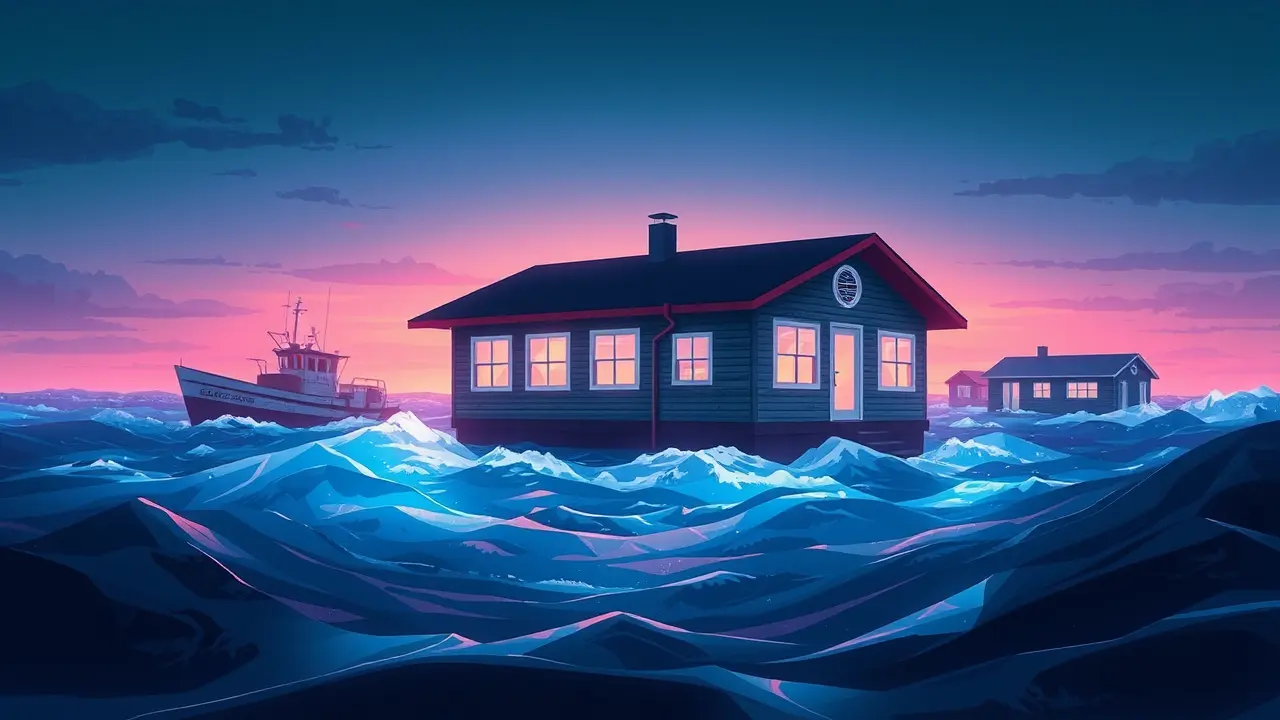US Coast Guard rescues people from floating house in Alaska.
In a stark and visceral illustration of the climate crisis's escalating frontlines, the U. S.Coast Guard executed a dramatic rescue of two dozen individuals in Alaska after their very homes were torn from their foundations and set adrift by a ferocious storm, an event that reads less like an isolated incident and more like a chilling dispatch from a new, unstable reality. This was not merely a weather event; it was a biomechanical failure, a point where the engineered world of human habitation collided with the unraveling natural one, a scenario climate scientists have long predicted with grim accuracy.The victims, whose identities remain shielded by the chaos, were likely residing in a coastal community increasingly vulnerable to the twin threats of intensified storm surges and the rapidly thawing permafrost, which undermines structural integrity much like a silent, subterranean rot. To understand the gravity of floating houses, one must look beyond the immediate heroism of the Coast Guard crews—who braved towering waves and hurricane-force winds in a display of breathtaking skill—and into the deeper ecological disintegration at play.Alaska is warming at a rate two to three times faster than the rest of the United States, its coastline crumbling into the sea as protective sea ice vanishes, leaving villages like Shishmaref and Kivalina as modern-day canaries in the coal mine, facing billion-dollar relocations or catastrophic events like this. The data is unequivocal: a 2023 report from the National Oceanic and Atmospheric Administration detailed how more than 80% of Alaska’s coastline is highly vulnerable to erosion, with storm frequencies and intensities projected to increase.This rescue, therefore, is not a conclusion but a prologue. It forces us to confront uncomfortable questions about infrastructure investment, federal disaster preparedness, and the very ethics of place in the Anthropocene.Are we prepared to fund the massive, managed retreat of entire communities, or will we continue to treat these events as episodic tragedies, responding with bravery after the fact rather than with foresight and prevention? The floating house is a powerful metaphor—a symbol of human resilience, yes, but also of our profound precariousness, a life raft in a sea of our own making. The emotional toll on these displaced families is immeasurable, their sense of security and home literally unmoored, a psychological trauma that will ripple long after the waters recede. As Rachel Carson warned us decades ago in 'Silent Spring,' we live in an era of consequences, and the images from Alaska are not just news; they are a biopsy of a planet in distress, a call to action that we ignore at our collective peril.
Latest News
The charts are whispering what the true believers have felt in their bones for weeks—Dogecoin is carving out a bottom.
17 hours ago5 comments
The Institute for Fiscal Studies has thrown a stark warning onto Rachel Reeves's desk, urging the Chancellor to confront a potential £22 billion shortfall in
17 hours ago3 comments
Alright, let's break down this absolute heater of a performance from the Chicago Blackhawks, because if you missed this one, you missed a party.
18 hours ago5 comments
The ice was hot last night in the NHL, folks, serving up a slate of games that felt less like a regular season Tuesday and more like a playoff preview with a
18 hours ago3 comments
The XRP chart is painting a tantalizing picture for those with the stomach to withstand the relentless pressure from crypto's leviathans.
18 hours ago4 comments
It’s in the small shifts, the quiet recalibrations of a Thursday morning, where the most meaningful change often takes root.
18 hours ago4 comments
In a move that sent ripples of quiet confidence through the crypto ecosystem, blockchain intelligence firms tracked a monumental treasury allocation from
18 hours ago4 comments
In a move that would have drawn a nod of approval from historical figures like Churchill, who understood the delicate balance of power within democratic
18 hours ago2 comments
BR
Brittany Miller123k23 hours ago
this is so scary tbh, idk how people are still denying climate change is real
0
JA
Jamie Larson123k23 hours ago
wow that's honestly terrifying to think about, our climate is really changing right in front of us smh
0
SK
Skyler Jones123k1 day ago
this is so terrifying but also feels like a scene from a movie the algorithm is gonna push this everywhere and it should
0
JA
Jamie Larson123k1 day ago
wow this is so scary to think about, saving this to read more later
0
JA
Jamie Lowe123k1 day ago
wait so the houses just went for a little sail on their own that's fine everything is fine
0
NI
Nina Flores123k1 day ago
this is just the beginning smh we're so not ready for what's coming
0
